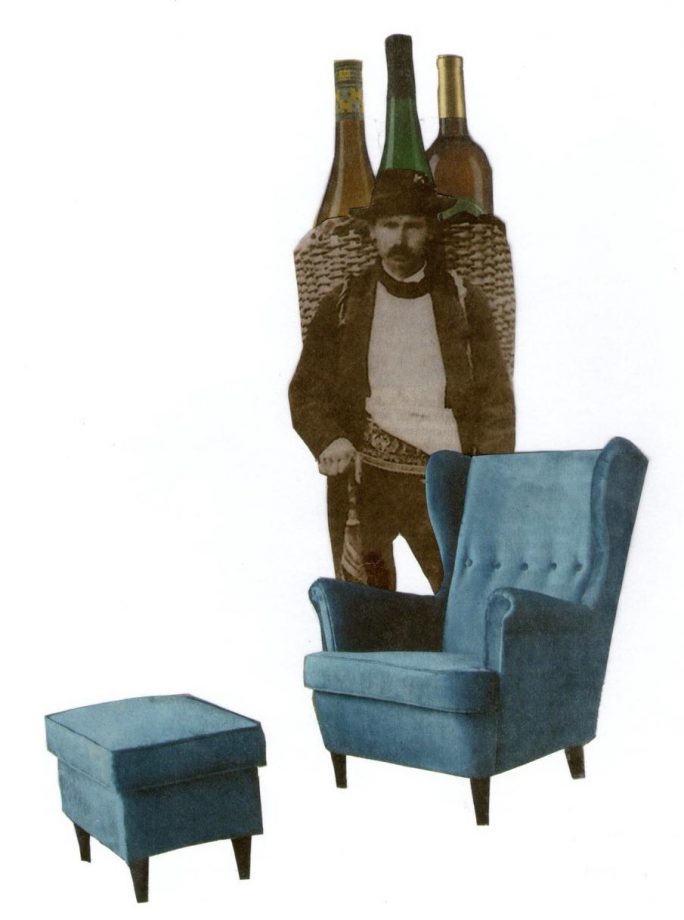Limiting Life for an Unlimited Time
A Student’s Perspective
‘It feels like we are in a puzzle. But there are missing pieces, so there is no way to see the whole picture yet. I guess they just forgot to put them in the package’ (a friend, March 2020).
The fear of loose ends
Student lives usually have to be quite flexible. We change our locations on a regular basis, be it for a new major, a semester abroad or because of the insane housing market. We always juggle plenty of tasks at the same time since study life does not end with attending seminars and writing papers. There are ongoing volunteering activities and work projects we force into our routines yet unbelievably still have time to find other fun things which keep us busy all day every day. There is always something, so ‘doing nothing’ is always a concrete decision. A few weeks ago, we all took a deep breath while being confronted with the Corona lockdown: There was this possibility that we experience months of ‘nothing’ without ever looking for this sudden void. Above all, we longed for first statements concerning rudimental questions about our studies, financial security, and personal future in general. However, we remained in abeyance and still do as we struggle to come up with a response to the sudden changes we are still facing. As I looked around in my circle of friends and acquaintances, I sensed fairly mixed feelings of uncertainty, panic, resignation, aimlessness, but also relief, serenity, overflowing creativity. However, even the optimistic ones finally agreed that their ability of being vastly flexible will most likely come to an end for the simple fact that flexibility needs to be built on at least ‘something’. After all, the different spheres of our lives are directly connected, so the slightest disturbance could cause an overall confusion of this cross-linkage up to the point where we find ourselves without any lead. Over the last few weeks, we witnessed this chain reaction come to life when we saw numerous areas of our lives slipping through our hands – one by one. As we know now, we can at least keep the label ‘student’ over the coming months. However, we lost other labels while rediscovering old ones. I believe that in order to stay sane, students really need to be able to study this summer. Certainly, this should be accomplished in a careful, elaborate way with respect to the latest transformations of our immediate surroundings and the students who were already structurally disadvantaged before the pandemic. The challenge – and at the same time required outcome – both manifest in a simple picture: a calm, secure(d) work space where we can think and progress without worrying about technical difficulties, former hierarchies, lost opportunities or how to finance our life.

Collage 1: ‘Galilei would be delighted’. Copyright: Lucia Schmid (April 2020)
The hunger for answers
‘It is this uncertainty I cannot bear any longer’ was clearly the most frequent answer I got when asking my friends about their current state of mind over the past few weeks. As we learned that there will definitely be a summer semester, some of those uncertainties got erased, but new ones arose: How is it possible to blend our former academic routine into the newly created Corona routine? What does it mean to be a ‘good student’ in the digital version of studying? How can we hold up our motivation without those heated face-to-face debates and – to be a bit more honest here – what happens to our discipline without attendance lists? Do we have to mentally postpone our estimated graduation date? Surely there were and are more urgent questions to clarify, for example: where are the financial safety nets for students? Student jobs are often not system-relevant, so from one day to the next we lose 100% of our (additional) income every month. During the first draft of this article (submitted on March 31, 2020), it felt utterly absurd to highlight the financial dependencies of students as there were those other individual fates which encounter existential threat, fighting for their daily lives. But in fact, the semester has just begun and there is still no governmental answer to what will soon be known as a nationwide student poverty caused by Covid-19. Luckily, students will continuously receive benefits granted under the Federal Education Assistance Act (BAföG) as well as scholarships up to one semester beyond the standard period of study as this semester does not count as a regular one. Unfortunately, politicians are ignoring the fact that if this is not enough, some families behind those who are affected probably cannot provide a second safety net. Moreover, we all know that there still exists a large group of students who do not receive financial support of the state, but at the same time cannot depend either on their relatives money-wise. Due to some spontaneous vacation cancelations or actual shortage of money, some of us already experienced what those next months could look like if there is no other way than moving back home. This throwback into old patterns during the early stages of the outbreak is worth mentioning as it presents significant challenges for our sanity if there is a long-term lack of governmental support.
Our freedom left us at the doorstep
Lately, I had some intense talks with dear friends who also suddenly found themselves back in their children’s rooms crossing out one event after another in their calendars. The sad summary: No flat, no income, no purpose. Until this point, we all kind of thought we had unlocked the next level in life and here we are, realizing that our stable world is not so stable after all. We were amused by the little limitations of our personal space when we visited our home two or three times a year, because ‘being the child again’ is just a natural phenomenon, isn’t it? And usually not too uncomfortable either. It becomes difficult, however, when we suddenly see our lives transform up to the point where we cannot return to normality, structurally and logistically speaking. As our families knew we would not experience a normal summer semester or study cycle in general, there existed the unspoken assumption that we could act as if we were on an intended visit and leave all our responsibilities outside the door. Time to do grocery shopping, take walks, have breakfast, lunch and dinner – all together. These few things already triggered a good deal of quite unhealthy side effects: We were never really alone. We struggled with our (study) assignments due to all those suddenly so time-consuming side quests (and we somehow had to be available on call – family- and study-wise). And nobody is talking about the fact that our whole nutrition was changing with the new surrounding as well, because, among other things, we shied away from demanding too many adjustments. The challenge therefore was to develop a new, modified routine for this exceptional time while facing other established arrangements. This naturally had an impact on our surrounding. With what right can we enter and modify our relative’s/family’s/other people’s rhythms when we clearly were the surprise guests? Speaking about guests: The longer we were staying at our ‘old’ homes, the more we transformed into our ‘old’ self who had once lived there – not guests but members of the household, holding up responsibilities for the entire unit, neglecting the fact that we had established our own tasks, routines and obligations in life.

Collage 2: ‘Surroundings do matter’. Copyright: Lucia Schmid (April 2020)
It became clearer to me how trapped some students really felt when I spoke with those who were able to return to their former student flats. Apart from the fact that nobody was sure if this relocation was actually legal according to the current restrictions, they all experienced an overwhelming feeling of freedom. After the move we returned at least partly to our normal routines and had the opportunity to really concentrate on study matters. No more explaining on how we can possibly need hours to write only one paragraph, a need that arose mainly in non-academic households whose other members may lacked sufficient understanding. I realize that from the outside it may seem ridiculous that we are being so rebellious about the comparatively mild Anti-Covid-19 measures as we have a roof over our heads. And in fact, those things happened in stable households with healthy constellations, which for me, however, does not devalue the importance of addressing those measures as they were stressful enough, but rather highlights the intensity of this situation.
The pressure intensifies
The pressure is obviously amplified for those who do not have a safe or – to some extent – harmonious space to escape to. Alongside the usual negotiations of hierarchies we encounter at home, there are those patchwork households where there is an overall lack of clarity about how to deal with given house rules because we clearly have not been part of this life for a long time. Maybe some of us changed or rather found themselves, their passion, their (sexual) orientations and now struggle to reconnect with old structures. Others find themselves in shifted dependencies where they help to foster their ill grandma or make important medical phone calls for their deaf parents as face-to-face communication is not compatible with official exit restrictions. And if there is an actual doctor’s appointment: Have you ever thought about the fact that face masks complicate the way deaf and hard of hearing people can communicate (Brooks 2020; Deutscher Gehörlosen-Bund e.V. 2020)? Furthermore, it is no coincidence that TV channels excessively broadcast emergency hotlines meant for people in abusive relationships of any kind (Die Bundesregierung 2020; Taub 2020). Then there are students who expect a child or already have a small family and now must re-organize their space and time normally reserved for study issues as kindergartens and day cares are closed. Additional difficulties occur to students with physical or mental disabilities. Will they be able to meet those fast-moving modifications we now have to integrate in our daily lives? And lastly, as this list could be extended endlessly: How can we even presuppose that every student has a home to come to? Be it a friend’s apartment or the family’s one. Maybe there is no such option at all.

Collage 3: ‘Home Sweet Home?‘. Copyright: Lucia Schmid (April 2020)
Concluding remarks
Recently, we lost a lot of our daily spaces where we could interact, brainstorm, and reflect. We continued being students when we had lunch in the canteen, took part in academic lectures, sweated in university sports classes, worked in laboratories or studied in the library. Now more than ever we need the confirmation that our room to grow gets otherwise secured as all those places and so many more are obviously not available anymore. It should be noted that this does not necessarily refer to a physically accessible place in the strict sense, though I suggest that this plays an important role. Be it in a metaphorical or literal way, what is most important is that we are given the opportunity to shape our personal room how we need it and not how we are forced to. I would like to see the image of a ‘calm, secure(d) work space’, as I mentioned in the beginning, come to life – namely for all those students who want to study this semester. For this to happen, we need immediate and unbureaucratic financial aid, tailored self-care offers for students, and long-term (study) perspectives. Figuratively speaking, such an approach means not only to stare into the current sky of uncertainty, but looking through the telescope in order to be sensitive to long-term needs of students.
First submission on 31 March 2020/revised version from 2 May 2020
Eva Steinberger is studying Social and Cultural Anthropology (MA) at Freie Universität Berlin and is a member of the Work Group Medical Anthropology within the German Anthropological Association (GAA). She continues collecting her experiences during the current corona pandemic as part of the Curare Corona Diaries Project.
The artist is a friend of the author and kindly provided her humorous collages about life in isolation.
#Witnessing Corona
This article was simultaneously published on the Blog Medical Anthropology . Witnessing Corona is a joint blog series by the Blog Medical Anthropology / Medizinethnologie, Curare: Journal of Medical Anthropology, the Global South Studies Center Cologne, and boasblogs.
Bibliography
Boasblog Witnessing Corona. 23 March 2020. Curare Corona Diaries Project: Call for Diaries in The Strict Sense of the Term. https://boasblogs.org/witnessingcorona/curare-corona-diaries-project. Last access: May 2, 2020.
Brooks, Laken. 2020. For the deaf or hard of hearing, face masks pose new challenge. https://edition.cnn.com/2020/04/02/opinions/deaf-hard-of-hearing-face-masks-brooks/index.html. Last access: May 2, 2020.
Deutscher Gehörlosen-Bund e.V. 22 April 2020. Das Verwenden von Mund-Nase-Masken ohne und mit Sichtfenster erschwert die Kommunikation zwischen Hörenden und Gehörlosen. Die Möglichkeiten der Kommunikation müssen vielfältiger sein! www.gehoerlosen-bund.de. Last access: May 2, 2020.
Die Bundesregierung. 6 April 2020. Hilfetelefon ist stark nachgefragt. https://www.bundesregierung.de/breg-de/themen/coronavirus/giffey-zu-haeuslicher-gewalt-1739470. Last access: May 2, 2020.
Taub, Amanda. A new Covid-19 crisis: Domestic abuse rises worldwide. The New York Times, 14 April 2020. https://www.nytimes.com/2020/04/06/world/coronavirus-domestic-violence.html. Last access: May 2, 2020.

































